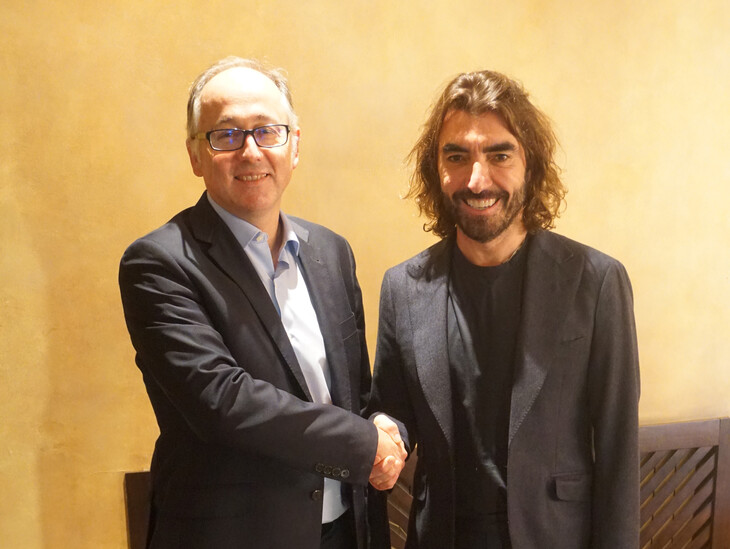
International Airlines Group (IAG) today announced an agreement with Globalia to purchase 100% of the equity of Air Europa, through its IBERIA subsidiary, for about 1,000 million euros, to be paid in cash on closing the deal.
This agreement will bring Air Europa into a solid group of airlines which have grown in size and profitability within the IAG holding company. Air Europa, which will continue to operate under its brand name, will now also benefit from the opportunities afforded by membership in the group.
The acquisition will help to make Madrid a more efficient hub that can compete on a better footing with the other major European hubs. In addition to enlarging the route network between Europe and Latin America, it will supply more connectivity and critical mass for opening new routes and growing in other market where its has only a minor presence today, while also offering better services to customers.
The deal is expected to be completed in the second half of 2020, once it is approved by all the relevant authorities. In the meantime, Air Europa will continue to compete against IAG airlines.
IAG’s CEO Willie Walsh commented:
“Acquiring Air Europa would add a new competitive, cost effective airline to IAG, consolidating Madrid as a leading European hub and resulting in IAG achieving South Atlantic leadership, therefore generating additional financial value for our shareholders.
“IAG has a strong track record of successful acquisitions, most recently with the acquisition of Aer Lingus in 2015, and we are convinced Air Europa presents a strong strategic fit for the group.”
Globalia’s CEO Javier Hidalgo said: “For Globalia, the incorporation of Air Europa to IAG implies the strengthening of the company’s present and future that will maintain the path followed by Air Europa in recent last years. We are convinced that the incorporation of Air Europa into a group like IAG, who over all these years has demonstrated its support to the development of airlines within the group and the Madrid hub, will be a success.”
Iberia’s CEO Luis Gallego said: “This is of strategic importance for the Madrid hub, which in recent years has lagged behind other European hubs. Following this agreement, Madrid will be able to compete with other European hubs on equal terms with a better position in Europe to Latin America routes and the possibility to become a gateway between Asia and Latin America.”
A very good deal for Spanish air connectivity, the Madrid airport hub, tourism, the Spanish economy, and customers
Madrid Hub
In terms of destinations, Madrid is in 19th place amongst Europe’s 20 largest airports.
In terms of the number of countries reached, it holds 9th place amongst the top 10 airports.
.jpg)

The deal dovetails with the Spanish government’s recently announced plans to invest €1.571 million to expand and improve the Adolfo Suárez Madrid-Barajas airport, which may now become a gateway between Asia and Latin America and between Europe and Africa.
.jpg)
Contribution to the Spanish Economy
A recent report by IATA shows commercial aviation to be vital to the Spanish economy. It provides some 1.7 million jobs and accounts for 9.2% of GDP (according to latest World Bank figures, referring to 2016)
IATA’s model indicates that every additional 1,000 passengers translates into 9 jobs and adds 850,000 euros to the economy.
According to the World Travel & Tourism Council (WTTC), one of every ten jobs in the world is in the travel and hospitality sector, as is one of every five newly created jobs, which is to become one of every four in the 2020-2029 period. This will make Spain much more competitive in long-haul holiday travel thanks to extending connectivity to emerging tourist destinations, most of which are now poorly connected to Madrid in comparison with other European hubs.
Under current market conditions, the incorporation of Air Europa into the group will add up to 12 million passengers, 10 new long-haul destinations, and a contribution of more than 280 million euros to Spain’s GDP.
More Customers
The possibility of opening more routes and making existing ones more sustainable. Since Vueling joined IAG, for example, it has added 70 aircraft (from 55 in 2012 to 125 today) and contributed some 11 million additional seats and 50 new destinations to the Barcelona airport.
IAG feeder routes will improve occupancy rates, to achieve profitability on currently unprofitable routes. This will be a great opportunity to grow in Asia, Africa, and North America.
Synergies arising from the deal will enable the group to compete with lower prices and better services, as did the union of Iberia and British Airways, as well as the JBA accords on routes over the North Atlantic and to Japan.
The coordination of flight programmes will bring more convenient and more frequent flying schedules, as occurred with the Madrid-Barcelona shuttle now served by both Iberia and Vueling, and the Madrid-London route operated by Iberia and British Airways
Customers will enjoy a larger choice and more flexibility in flying times.
Customers will also have more opportunities to earn and redeem frequent flyers points. Suma members will not lose their status when they join the Avios programme.
More possibilities to invest in customer services, VIP lounges. Aircraft, etc.
Sustainability
Better feeder routes and aircraft occupancy rates will translates into less emissions per passenger.